Raiders to Las Vegas!
In a recent decision approved by NFL ownership 31-1, with only the ownership of the Miami Dolphins dissenting, the Oakland Raiders have had their move to Las Vegas approved nearly unanimously. I write about it more in-depth in this article.
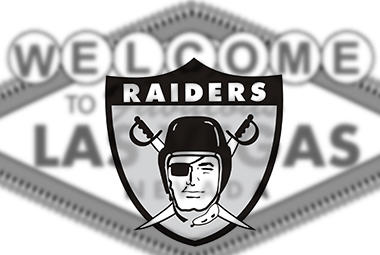
The Raiders are expected to begin play in Las Vegas as of 2020, though it could possibly be earlier if they get the sort of reception that the Houston Oilers got prior to moving to Tennessee. It has been widely reported that those games were basically a ghost town.
The stadium deal that drew the Raiders to the city sees them enjoying a financing arrangement in which the State of Nevada will subsidize the stadium with at least 950 million in tax dollars. 750 million of that is for the actual stadium while 200 million is committed to the infrastructure surrounding the stadium. It’s a bad deal for The State of Nevada (in terms of RoI potential) and a bad deal for much of the public, but a great deal for the Raiders!
The source of the tax revenues is reported to be a new flat tax on hotel rooms, which is not an altogether uncommon source of tax revenues. In that sense, it will be all of the visitors to the State of Nevada who will be paying for the Raiders to relocate there as the majority of the revenues will not come from in-state residents. One could argue that is a fair deal for residents, but certainly if the state can approve a new hotel tax to bring the Raiders to Las Vegas, then they could have identified an even better cause to initiate a new tax like, I don’t know, schools?
The Greyhounds in WV to Stay...For Now
The State of West Virginia had their backs against the wall as they faced a 450 million state budget shortfall for the 2018 tax year. Given that fact, it seemed like an easy decision to eliminate the fifteen million dollar Greyhound Breeders Development Fund, but apparently not. The Legislature passed the measure to eliminate the fund by a count of 56-44.
The Senate Bill had previously passed 19-15, so it looked as though the Greyhound Breeders Development Fund would be eliminated.
Unfortunately, Governor Jim Justice opted to veto the measure citing the jobs that exist because of the fund.
The brief backstory of the Greyhound Breeders Development Fund is that it started as a result of the State of West Virginia allowing casino gambling in order to save the ailing racing industry, horses and greyhounds alike. The first location authorized to have slot machines was the Mountaineer Racetrack (now Mountaineer Resort and Casino) who, in 1990, was authorized to have up to 400 slot machines of which 15% of the Gross Gaming Revenue would be diverted to the track.
In 1994, the State of West Virginia expanded gambling and allowed the other state racetracks to have a casino on the contingency that they continued to operate the tracks. Part of this contingency was a fund known as the Greyhound Breeders Development Fund by which 15% of Gross Gaming Revenues would be diverted to greyhound breeders who then distribute the money amongst their trainers (as pay) and buy necessities for the greyhounds. It has been pointed out that a single, ‘Kennel,’ can cost as much as $3,000/week.

The point of the matter is that this fund was put into place because the greyhound racing industry was dying and had absolutely no hope of operating profitably on its own. This year, the fund is set to pay out an estimated 13.2 million to dog breeders, an amount that has been falling on a year-over-year basis as the presence of an increasing number of out-of-state casinos has taken its toll on the revenue of the home casinos with greyhound tracks.
The fact that these monies come entirely from video lottery revenues essentially means that the state is forcing the two casinos with greyhound racing (Wheeling Island Hotel-Casino-Racetrack and Mardi Gras) to subsidize a segment of their casinos that is utterly failing and has been failing for several decades. In a 2014 study, Wheeling Island pointed out that the greyhound track basically breaks even on a year-over-year basis, but that’s if they do not count the subsidy as an expense.
Since then, the casino has lobbied to get days removed from the racing calendar simply because the greyhound track no longer operates profitably (or at break even) even AFTER being bolstered by the subsidy. Far and away, the majority of the betting done on the races come from out-of-state racetracks simulcasting Wheeling Island’s races, as the sport is rapidly losing popularity. To that point, the number of greyhound tracks in the country that offer live racing has fallen precipitously over the last several years.
Without the subsidy coming from the video lottery revenues of the two casinos, the greyhound track would lose millions of dollars per year, and in fact, the greyhound track DOES lose millions of dollars per year. The casinos are just forced to sustain the track with this fund. For example, the fund is used to bolster the purses for the greyhound races and, as it turns out, over 97% of the monies in the purses comes from the fund with the paltry remainder actually coming as a result of direct on-track betting.
In fact, for 2014, the total amount in live wagers was barely over fifteen million dollars, which interestingly enough, was the amount that went into the subsidy that year. In other words, every $1.00 that is spent on the greyhound results in $1 of live wagering. Even if we assume that those wagering on the dogs are eating a 25% house edge, (it’s lower than that) then the conclusion is that the Greyhound Breeders Development Fund basically pisses away $0.75 of every dollar before taking into consideration other factors such as track upkeep, employees working at the track directly (concessions and cashiers) as well as any other direct costs that do not pertain to the breeders.
In terms of the actual owners of the dogs/kennels, most of those owners are themselves out-of-state, so it is tough to argue that the monies are actually benefitting the state in any real way. It is true that there are jobs for the trainers of the dogs, but let’s investigate the claim that some 1,700 would be lost for in-state residents if this fund is eliminated:
First of all, it has been estimated that the fund will bring in 13.2 million for this year as opposed to its high of just over fifteen million. The argument Jim Justice makes for the veto, as well as the argument any Senators/Legislators who voted, ‘No,’ made is that this would kill some 1,700 jobs. We also must look at the number cited that a single greyhound kennel can cost up to $3,000 per week, but remember, that also includes paying the staff.
The immediate conclusion we can reach is that this Greyhound Breeders Development Fund provides mostly low-paying part-time jobs. It has been stated that, in 2014, there were roughly 1,400 greyhounds being kept for the purposes of racing in the State of West Virginia. The first thing that we are going to do is assume that a full 50% of the revenues siphoned off of Gross Lottery Revenues for the fund go to the breeders’ employees:
Therefore, we are going to assume that 6.6 million dollars per year goes directly to paying the trainers and other employees associated with the dogs themselves. This assumption is probably entirely overshooting the case, but that’s okay. As the claim goes, there are 1,700 employees of the greyhound racing industry who would be at risk if this fund were eliminated, so the most raw number we can look at is:
6600000/1700/52 = $74.66
Which means that each employee of the greyhound racing industry, given our 50% assumption, makes $74.66/week. Even if we assumed that every dollar that goes into the breeders fund goes to the employees, as if directly:
13200000/1700/52 = $149.32
Which means as a best case (and impossible) scenario, you average greyhound racing employee makes $149.32/week as a result of their employment.
The minimum wage in the State of West Virginia is $8.75/hour, so even ignoring the fact that certain taxes would need to be matched by the employers (the kennels themselves) we will very graciously assume that the amounts per week cited above go entirely to the employees, anyway, when in fact, they probably actually make even less than that.
74.66/8.75 = 8.53
$149.32/8.75 = 17.07
What that means is that if the workforce count is correct, the average greyhound racing employee makes $8.75/hour and works 8.53 hours/week (assuming half of the money from the fund pays employees directly...which it doesn’t). If we assume that every single penny that goes into the Greyhound Breeders Development Fund pays the employees (it doesn’t, obviously, because that means the dogs would not even eat) then the average employee would make $8.75/hour and work 17.07 a week.
In other words, assuming the job count is accurate, the monies that come from the fund are largely going to sucky part-time jobs anyway, for the most part. If nothing else, it would make more sense to take more money from the fund than actually goes to the employees as pay and throw it into the welfare pool for the state, more people actually located in the state would receive a greater total sum of money as a result.
There was a time when it could be argued that subsidizing the racing industry made sense, but that was over two decades ago when the greyhound racing industry was merely hurting as opposed to dead. The simple fact of the matter is that the fans of greyhound racing are literally all dying and they are not being replaced by anyone new with an interest in the sport. These people never will be replaced by anyone with an interest in the sport.
While my position is that dog racing should end entirely, of the six states that have legal dog racing tracks, (that are still operational, it is technically legal in four other states with no actual operations) what would make the most sense is to consolidate everything into one or two tracks (across the country) and for some sort of simulcasting revenue sharing to be worked out with the one or two operational tracks. As it stands now, the tracks only really make money off of their live handle and/or in-state simulcasting handle.
The revenues that will, at least for one more year, be going to a completely dead sport would have instead been converted to the state’s General Revenue Fund. Granted, I also disagree with doing that because the casinos are already taxed enough on their table game and slot revenues, but it is a very slight improvement over wasting the money on greyhound racing. What makes more sense, in my view, is to 86 the Greyhound Breeders Development Fund and allow the casinos to keep a little more of the money that belongs to them, especially in light of out-of-state (but nearby) competition that did not exist when the casinos first opened.
I cannot emphasize this enough, greyhound racing is dead.
Gone.
Over.
Obsolete.
It’s not like these greyhound tracks are competing for market share against other greyhound tracks that are nearby, the two closest states to West Virginia that offer live greyhound racing are Alabama and Iowa. The simple fact is there is no competition for market share because that would first require there be a market to share. There is no market. This is why you see smartphones in stores these days and not the little flip phones which only call and text. The little flip phones, like greyhound racing, are obsolete.
Why can’t the states do anything right when it comes to gambling?
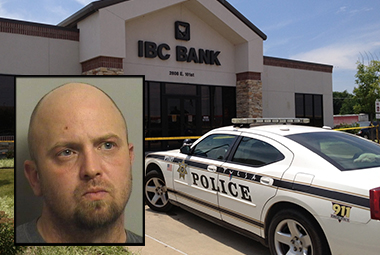
Just Like He Leaves the Casino
A man named Kevin Scott Puryear left an IBC bank location in Tulsa, Oklahoma just like he usually leaves the casino, apparently.
The man allegedly walked into the bank and handed the clerk a note demanding money, but (for whatever reason) the clerk was unable to access the money, so Puryear allegedly picked up his note and fled the bank. He walked across the street to his girlfriend’s car, but someone was able to get the tag number to the vehicle. After going to the casino, he was later tracked down by police.
As motivation for the robbery, Puryear cited both an addiction to drugs and gambling, according to police.
Absolute Poker Funds to be Distributed
In a process similar to the claims process for Full Tilt Poker after poker’s, “Black Friday,” those players defrauded by Absolute Poker are going to be able to submit claims for lost monies by visiting.
The Department of Justice, who had previously seized all of Absolute Poker’s U.S. assets, is now going to be distributing the money through that channel. The DoJ has determined, provided the seized funds cover the amounts, that they will pay out to a player that player’s last known balance with AbsolutePoker.com for players based in the U.S. To begin, one simply needs to input the E-Mail address used for the site, the person’s last name, and the screenname used on the site.
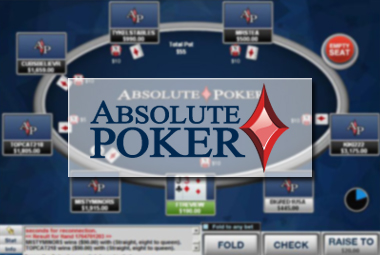
If you receive an E-Mail inviting you to fill out a Petition for Remission, then keep in mind that you must do that by June 9th of this year. If you do not, then any funds to which you would have otherwise entitled will be forfeited. Again, if you do not receive an E-Mail, but believe you had an AbsolutePoker account with a balance at the time of that site’s shutdown, then you can go to the site I linked above and fill in the required information.
The process will be pretty difficult and require substantial documentation if you disagree with the amount that the DoJ says that you are owed. The reason why is because it is based on your last, “Known,’ balance, so if your amounts are inconsistent with theirs, then you will need to submit extensive documentation proving you are owed more than that.
It is also important to remember that this remission is only for the purpose of the account balance as of the time of the closure of the site. Any previous losses or anything other than the account balance that was reflected as of the closure of the site, or what your account balance should have been if it is for some reason incorrect, has nothing to do with this.
Hard Rock AC Plans Underway, Purchase Finalized
The Hard Rock Casino Hotel in Atlantic City is officially a go as the purchase of the former Trump Taj Mahal location off of owner Carl Icahn has been finalized. The plan involves 375 million to be pumped into the property for the purpose of renovations and for the property to reopen in Summer of next year.
In addition to renovations of guest rooms and suites, the Hard Rock plans to increase the scope of the building to include two arenas in which sporting events and shows will be held. Between the two arenas, there is projected to be seating for as many as 7,000 occupants. Additionally, the meeting rooms are going to be redesigned with an eye towards being able to accommodate events both small and large.
As one would expect, the outside of the casino is going to be largely redesigned in order to incorporate the general Hard Rock theme, but some elements of the Taj Mahal design are expected to remain. The purchase price of the former Taj Mahal has not been disclosed, but filings have indicated that Icahn valued it at 86 million dollars, according to the Press of Atlantic City.
Management indicates that the plan is not to simply siphon off business from the seven remaining casinos in Atlantic City, but to market in such a way as to drive new business to the city.
While that may seem overly optimistic, one must keep in mind the fact that Hard Rock already runs a wide variety of casino locations across the country and may be able to direct marketing efforts at some of their already existent patrons. They might even end up being a micro-version of CET who, if they’ve done almost nothing else right, have done an extremely adept job at keeping their players in their hotels regardless of what gambling market they are visiting.
Even with that, the new Hard Rock absolutely cannot be profitable without pulling some traffic from the other casinos in Atlantic City, so while all of the casinos are doing well in that market right now, look for some of those previously thought to be off the chopping block to be right back on it when the Hard Rock opens for business. Those properties include Bally’s and perhaps Resorts as the two most likely to be in trouble upon the opening of the Hard Rock Hotel Casino. While Golden Nugget was once thought to be in trouble, given the strength of their online product (best of any in New Jersey in terms of revenue) and the impressive improvements to their revenue as of the closing of the other casinos in Atlantic City (2014) they should be fine.
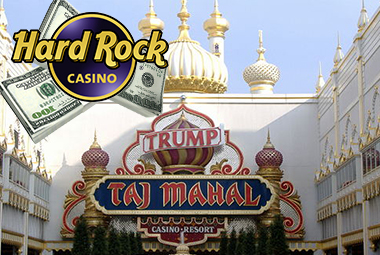
Executives from Hard Rock also report that they considered purchasing the former Revel casino which is to be renamed TEN if it ever reopens. The owner of TEN, Glenn Straub, denies ever speaking with anyone from Hard Rock about a potential deal, but notes that a number of entities were interested in purchasing the casino shortly after he bought it out of bankruptcy.
Whatever the final product is, we can expect it to be nothing short of impressive as they are putting an amount of money into renovations that exceeds what it costs to build a new casino from the ground up in some areas of the country.
For those concerned that a project with the scope that Hard Rock is talking about is doomed to crumble under its own weight, just as Revel did, there is no reason to be concerned for a few reasons:
Unlike the Revel, the Hard Rock has a significant customer database and, as mentioned, will be able to market to individuals who already go to other Hard Rock properties as it is. While this will certainly not represent the entirety, and probably not even the majority, of their business, it is more than the absolutely nothing that the Revel started with in terms of customer database. The fact of the matter is that the Revel needed to open and immediately attempt to generate a loyalty to the casino, and they failed at that task extravagantly. Fortunately for Hard Rock, they will be able to market to people already somewhat loyal to the Hard Rock brand.
It is also worth mentioning that the Hard Rock is adept at operating casinos and owns/operates casinos in markets across the entire country small and large alike. This was also true of Revel, to a certain extent, but unlike the Revel, Hard Rock is not going to attempt to reinvent the wheel or to create a market that simply doesn’t exist. Among other things, the Revel attempted to be an entirely non-smoking casino, (completely unheard of in a market that allows for smoking) did not have a buffet and did not want to comp any rooms upon opening (even to holders of high-level cards in competing casinos) without first seeing actual play. Essentially, not only did they not have a customer database from which to pull initially, but they also did everything they could to make it an uninviting atmosphere for new players.
The most important reason Hard Rock can succeed, however, is that Hard Rock is not going to be saddled with crippling debt even after making these renovations. Hard Rock is one of the most successful casino chains in the entire world (and also operates more than a hundred restaurants unaffiliated with casinos) and has a balance sheet backing up the amount of money that they are putting into the property. In the meantime, Revel was saddled with over a billion dollars in debt and was in a position where they needed to be profitable right out of the gate.
The Revel adopted a very aggressive approach in attempting to do this with the goal of generating positive revenues in every aspect of the business. They did not comp rooms, for example, because they needed to be able to sell them and still have the patrons gamble there, with exception only to the highest of high rollers. Former CEO Kevin DeSanctis said as much when he stated, “At most casinos, 75% to 80% of occupied rooms are comped. What’s the point? We think we have a product people will actually come and pay for.”
Some people may have went to the Revel and paid for the product, but certainly not enough of them. The refusal of the property to comp rooms upfront or to do any of the other myriad of things that are expected from a casino contributed substantially to its failure, but at the same time, the property was in the desperate position of having to generate profits right out of the gate.
Instead, only after DeSanctis was ousted from the CEO position did the casino enjoy its first month of exceeding operating expenses. The Revel offered a, ‘You Can’t Lose,’ promotion in the form of a $100,000 loss rebate to take place over an entire month. That was enough to get some gamblers into the building, but of course, that itself ended up being embroiled in controversy.
Either way, there can be little question that the Hard Rock Hotel and Casino in Atlantic City should be successful. The only question is whether it will come at the expense of one or two casinos currently in operation?
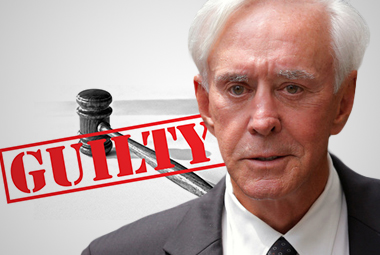
Billy Walters Found Guilty of Insider Trading
Billy Walters has been found guilty of insider trading and, upon his sentencing scheduled for July 14th, may face as many as twenty years in prison. The sports bettor was found to have been engaging in insider trading with respect to his investments in Dean’s Foods which netted him over thirty million dollars in profits and enabled him to duck almost eleven million dollars in losses.
Thomas Davis, a former chairman of Dean’s Foods struck a plea deal and rolled on Billy Walters, Thomas Davis, of course, was the source of the inside information. Davis has a little of the gamble in him himself, quite apparently, as he went to Vegas to party and dropped 50k on the day after signing the plea deal.
The story Davis tells is that Walters would make loans to the financially ailed Davis in exchange for the inside information. Information included the purchase of Darden foods (so Walters bought stock in that corporation) as well as the spinoff of a unit of Dean’s Foods.
No matter how one looks at it, this is open-and-shut point blank insider trading, so even if Davis rolled on Walters, it is tough to feel sorry for Walters who took a big gamble and won, but followed it with the biggest loss of his life...the one that came in court.
Golfer Phil Mickelson was also indicted as a, ‘Relief Witness,’ in a Civil Charge related to the insider trading. Like Davis, Mickelson owed Billy Walters money, but engaged in an insider trade involving Dean’s Foods (this one had to do with the spinoff of a segment of the company) that netted him just under one million dollars. Mickelson then used that money to pay Walters back.
Sports and Jersey
On Monday April 10th a number of individuals associated with the sports betting industry, executives for the casinos in New Jersey and anti-gambling advocates on behalf of the NCAA and the four major sports leagues met in Washington D.C. to discuss the case of sports betting in states outside of Nevada set to go before the Supreme Court.
For New Jersey’s part, they were the only state that did not have any form of sports betting at the time of passage that was given the opportunity, after PAPSA, to pass regulations with respect to sports betting. PAPSA explicitly gave the State of New Jersey one year after the passage of the bill in order to draft laws within the state to make sports betting legal within its borders. New Jersey did not decide to avail itself of this exclusion, at the time.
However, there are six other states at this time that were not PAPSA exempt, or even potentially so, that intend to offer sports wagering immediately in the event the Supreme Court decides in New Jersey’s (and, by extension, their own) favor. In addition to the states that would already operate legalized sports betting, it can be presumed that the aspect of PAPSA pertaining to casino sports betting would also be revoked in other states with commercial casinos, thereby freeing up any state to offer sports betting provided they regulate it in one fashion or another.
It is also possible for the horse racing industry to benefit if PAPSA is eliminated as the horse tracks could, theoretically, begin to accept sports wagers. The six states to file briefs in favor of eliminating PAPSA and to have initiated plans for legalized sports betting are Maryland, Michigan, New York, Pennsylvania, South Carolina (interestingly!) and West Virginia. Residents or would-be visitors of those states can look forward to legalized sports betting shortly to follow the Supreme Court decision.
Of course, that decision is itself going to take some time as the hearings must first be scheduled after all briefs filed in which attorneys on both sides will be set to debate the legal merits of the case. After that takes place, everything must be reviewed and then the Supreme Court will eventually render its decision. In all likelihood, everything would be completed in the second half of this year with sports betting in the six states likely to go into effect next year should the ruling break in favor of sports betting.

And, yes, I understand legal sports betting would also bolster the greyhound tracks, but if you count the forced subsidies against them, I can guarantee that the existence of the greyhound tracks will remain a net negative overall.
The fact of the matter is that the Supreme Court should scrap PAPSA for a myriad of reasons. The first reason is because it is fundamentally Unconstitutional to begin with. The United States of America’s Federal Government has absolutely no authority to govern sports betting or anything else gambling-related because the Constitution gives the government no such authority. Furthermore, the states are allowed to do what they like in all other aspects of gambling-related Legislation except for sports betting, so the Federal Government already has effectively disavowed itself of the ability to enact laws related to gambling.
Another reason that PAPSA should be eliminated is because PAPSA is fundamentally stupid. Sports gambling revenues represent just another aspect of general gambling revenues that would be taxed, and therefore, would generate tax revenue for the states. Profitable casinos also have their incomes tax by both federal and state governments, so even in that sense, any sports betting that would go on would increase taxable revenues both nationally and on a state-by-state basis.
Finally, people are already doing it. While individual bettors are very rarely prosecuted (if ever) there have been almost countless sports betting rings broken up and bookies arrested throughout the United States since the passage of PAPSA in 1992. The fact of the matter is that sports bettors outside of the State of Nevada might be partially deterred by the fact that sports betting is technically illegal, but the majority of individuaL bettors are not at all deterred and instead find ways to bet on sports anyway. This, of course, represents revenue that could already be going to legalized betting venues and being taxed. Instead, bookies who are only regulated by whatever the hell they want to do at the moment continue to operate and profit whereas a regulated framework (by the state) would result in better protections for the bettors than does sports betting being outlawed.
The people that want to bet sports get to bet sports legally and the state and federal governments make money, seems pretty win-win from where I sit.
Don’t Push My Buttons!
Jan Flato made a discovery at the Seminole Hard Rock and Hotel Casino in January of this year, and that discovery was the winner of a jackpot is whoever hits the button. According to the Miami Herald.
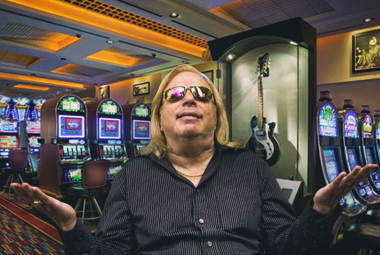
Flato was playing with a woman named Maria Medvedera Navarro who was cozied up to him hitting the button on his machine when it hit for a $100,000 jackpot. As Medvedera-Navarro was the individual who hit the button, the casino (as most casinos would) determined that she was entitled to the jackpot. The casino adjudicates jackpots based on not who puts the money into the machine, but rather, based on whoever hit the button at the time of the jackpot.
The reason for this hard and fast rule is likely because it prevents the casinos from having to involve themselves in any disputes if an argument arises as to who the money should belong to. The casino does not have to get involved if they just go off of whoever hit the button. The only possible exception would be if a button was hit without the permission of the player in question, but then, it is difficult to say whether or not the player actually seated at the machine would get paid as the only money that would technically be stolen is the money that made the bet itself.
For her part, Navarro claims to have had $400 of her own money invested into the machine and claims that Flato denied a portion of the jackpot when she offered it to him. She states that she started by putting her own $100 into the machine which she then ran up into a $400 voucher that was then placed into a machine costing $50/spin and that she allowed Flato to put his player’s club card in the machine as it was being played.
The only part of the story that is not in dispute is that Navarro asked casino security to walk her out with her $50,000 cash and $50,000 check and to keep Flato away from her in the process.
Without further investigation, that the casino has no reason to be interested in actually doing, we will never really know who the money that fed the machine originally belonged to. With that said, do not let anyone push your buttons for any reason!
Like 65 Blackjack, Pay-to-Park Spreading
CET has announced that it will begin charging individuals to park at its properties located on the Las Vegas Strip with parking fees expected to be $8/night for individuals visiting LINQ and $10/night for the other CET properties in town.
Though they do not state it directly, CET claims that charging for parking is not a money grab as it pretty clearly was when MGM first took on the policy. Instead, CET claims that the move comes as a result of their guests/patrons complaning that they are now experiencing difficulty finding anywhere to park.
Even though I am usually not the biggest fan of CET, and while I strongly suspect that these parking charges are at least partially a money grab, I do tend to believe that their self-parks might be more crowded than they once were. It is reasonable to suggest that individuals intending to visit the MGM properties (but put off by the parking fees, which are now imposed on locals, as well) are simply parking at the CET properties and walking to the destination MGM property to take advantage of the free parking.
After CET implements this change, we should probably expect Treasure Island to follow suit for their self-parking as visitors to both CET and MGM properties will find themselves trying to escape parking fees by parking at TI. The same might eventually happen at Wynn, Encore, Venetian and Palazzo as well.
Thanks MGM.
PA Parlors Soon to Appear?
Senator Guy Reschenthaler of Allegheny County (Pittsburgh area) Pennsylvania has pointed out that there are some 40,000 illegal video gaming terminals (unregulated slots and other machine games) on his own website.
Stepping outside the legislative tradition of not wanting to do things that make sense, Reschenthaler suggests that the Pennsylvania Gaming Commission be authorized to expand gambling to parlors and perhaps other limited video lottery locations, as neighboring West Virginia has already had in place for several years.
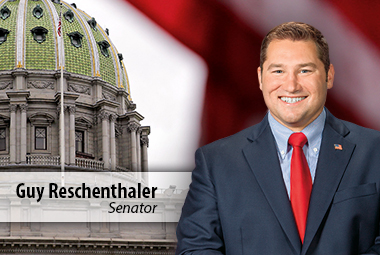
Reschenthaler cites the fact that the machines already exist in several Pennsylvania bars and, in some jurisdictions, very little enforcement is done to get rid of them. The Senator also points out that the revenues on those machines are not taxed as they would be if similar machines were to be licensed and regulated by the state.
Legalizing and regulating limited video lottery locations would also have the side effect of incentivizing the state to actually do something about these unregulated machines, many of which are devices known as, ‘Cherry Master.’
The way that the limited video lottery approach works in West Virginia is that the two types of entities that are licensed to have machines are either private clubs/fraternities or public businesses that must also have a West Virginia liquor license. These businesses in West Virginia are often bars, some of which existed even prior to such machines being legalized and regulated and may have up to five machines on their license. The other types of businesses are colloquially known as, ‘Parlors,’ and generally came into being only after the legalization of up to five gaming devices in public establishments, however, a few such parlors simply converted into parlors after previously being coffee shops only.
Additionally, private clubs/fraternities are permitted to have up to ten machines pursuant to West Virginia law, and these are Members clubs which are permitted (in some cases) to also have guests play the machines. The ones permitted to have guests have the stipulation that they must operate on a strictly non-profit basis in all aspects of the business. Private clubs operating on a for-profit basis may only permit guests if the guests are with a member of the establishment.
Other laws in West Virginia concerning the bars/parlors are that smoking is allowed in the parlor area (absent Municipal laws to the contrary) but must be limited to the parlor area in the case of restaurants that allow individuals under twenty-one years of age to be present. If a business does not allow individuals under twenty-one years of age on the premises, then such businesses are not require to have the machines housed in a separate room and may allow smoking anywhere on the premises. Again, that is absent any Municipal laws to the contrary, one example of which would be a smoking ban that covers all of certain counties.
The parlors represent a substantial source of tax revenue for the State of West Virginia and also provide a substantial source of employment for the state. While these parlors might pull some business from the casino, revenues in the State of West Virginia have shown that the effects on the casinos are minimal as the parlors largely attract individuals who would not visit the casino absent the parlors. Furthermore, and this is especially true in the case of Pennsylvania, these limited video lottery machines will generate revenues by way of attracting people for whom a trip to the casino is inconvenient. These are people for whom there is no, ‘Local casino.’
Reschenthaler’s proposal would make the machines slightly less attractive than those in West Virginia because, while the maximum bet would be capped at $5 in Reschenthaler’s proposal (WV’s Max Bet is lower) he would cap payouts at $1,000 per individual, per day. West Virginia has no caps on how much an individual may be paid out in a day setting only maximum single jackpot limits of $25,000.
West Virginia Mulls Changes to Limited Video Lottery
In somewhat related news, West Virginia is considering making a few changes to their limited video lotttery operations.
In terms of changes that would actually impact players, the lottery is first considering increasing the maximum bet on machines from $2 to $5. The current $2 maximum permitted bet has been in place at West Virginia Limited Video Lottery locations since 2001, when the limited video lottery was initially legalized.
The next change that will impact players is that the machines will have the bill validator restrictions lifted so that players can actually use $50 and $100 bills in the machines. The current law is such that the machines are not permitted to accept any bill larger than a $20. This, of course, is a completely pointless restriction.
Finally, the West Virginia Lottery Commission also wants to consider the matter of expanding the games inventory to allow for Progressive games at their limited video lottery locations. ( I am REALLY pulling for this one!) The current law is such that there are actually very few games that the limited video lottery retailers can offer that have been approved by the commission and all of these games are fixed payout.
The allowance of progressive machines will likely not change the requirement that the lottery vendors have posted, or available upon request, the minimum payouts on their machines, but it does introduce the possibility of advantage play for savvy players.
Pai-Gow Tiles Cheating?
According to the NWI Times, a dealer at AmeriStar East Chicago stands accused of cheating her Pai-Gow Tiles game.
Li Rong Gao stands accused of deliberately altering the probabilities of the game by intentionally dealing herself poor hands when playing against three individuals that she knows. She is accused of successfully defrauding the casino of just over $26,000 over the course of about a month and a half.
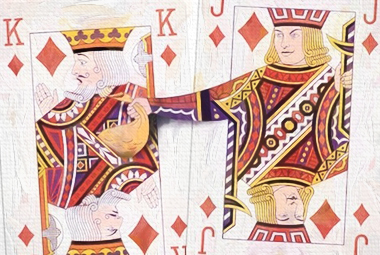
According to the report, a casino shift manager reported the matter to the Gaming Commission simply because he did not believe that the table was performing well enough during the time in question. Upon being questioned by police, the report states that the dealer claimed she was merely, “Making a lot of mistakes.”
Even though she got caught, tiles almost makes sense as a casino game to try such a scheme because it is not one that is well-known by most people, presumably including surveillance. As stated in the news report, the surveillance manager only became suspicious because the game was not holding well enough.
Principal Likely to Face A Detention (Center)...
We’ve had sheriffs in Pennsylvania, regular joes in West Virginia and Connecticut, dog shelter managers in New York and now we can add high school principals in Maryland as among those who are accused of having defrauded their places of employment in order to illicitly obtain gambling money. According to the Baltimore Sun.
High School Principal Leslie Lewis stands accused of withdrawing $13,400 at Maryland Live Casino from a school account in order to pay for gambling. Lewis is additionally accused of falsifying over $40,000 in purchase orders to obtain technology from the school system including computers, laptops, tablets and flat screen TV’s. It should come as no surprise that the school closed after three years of her being the principal.
That does it for this edition of News & Notes, thanks for reading and see you next time!



